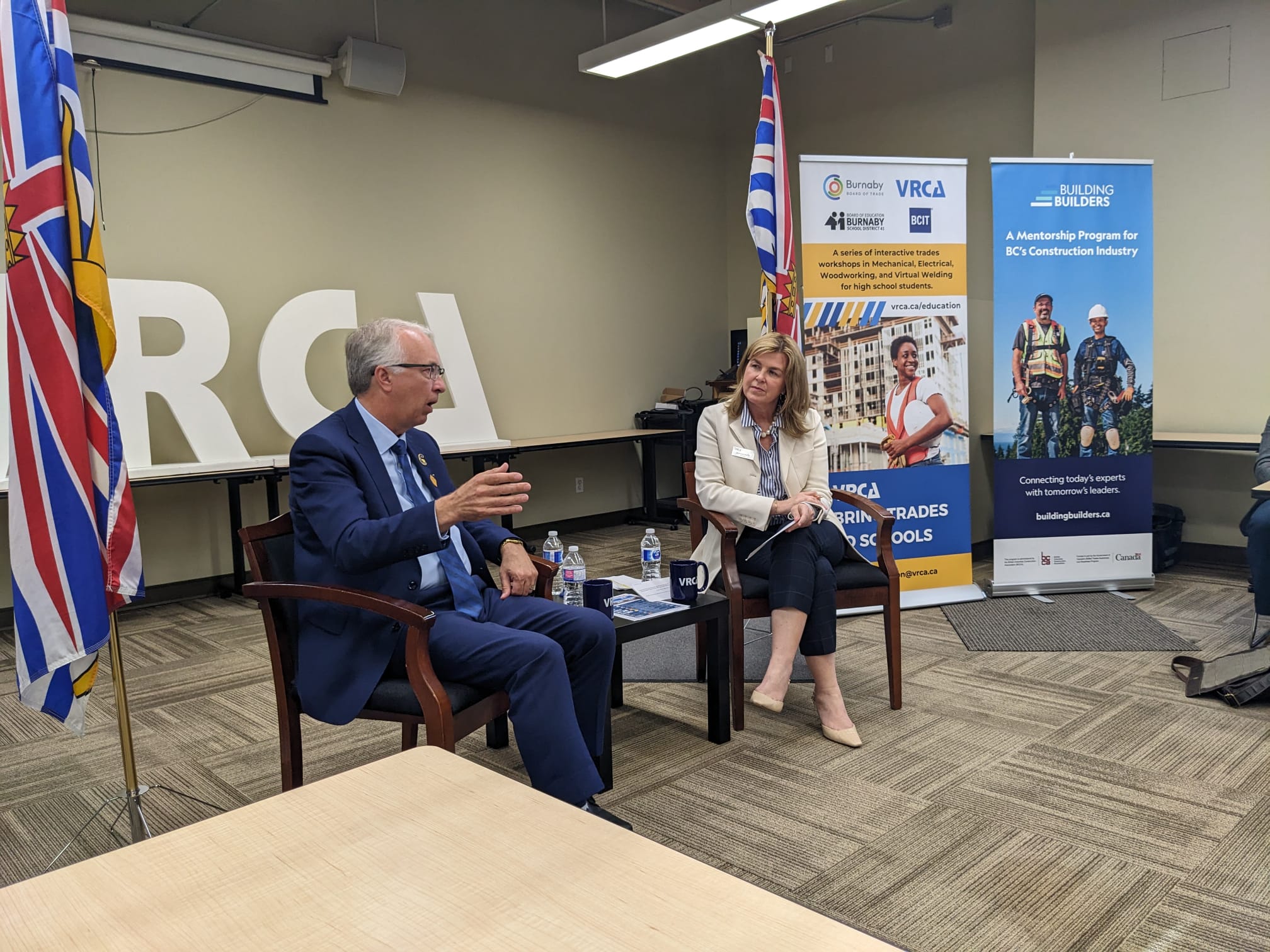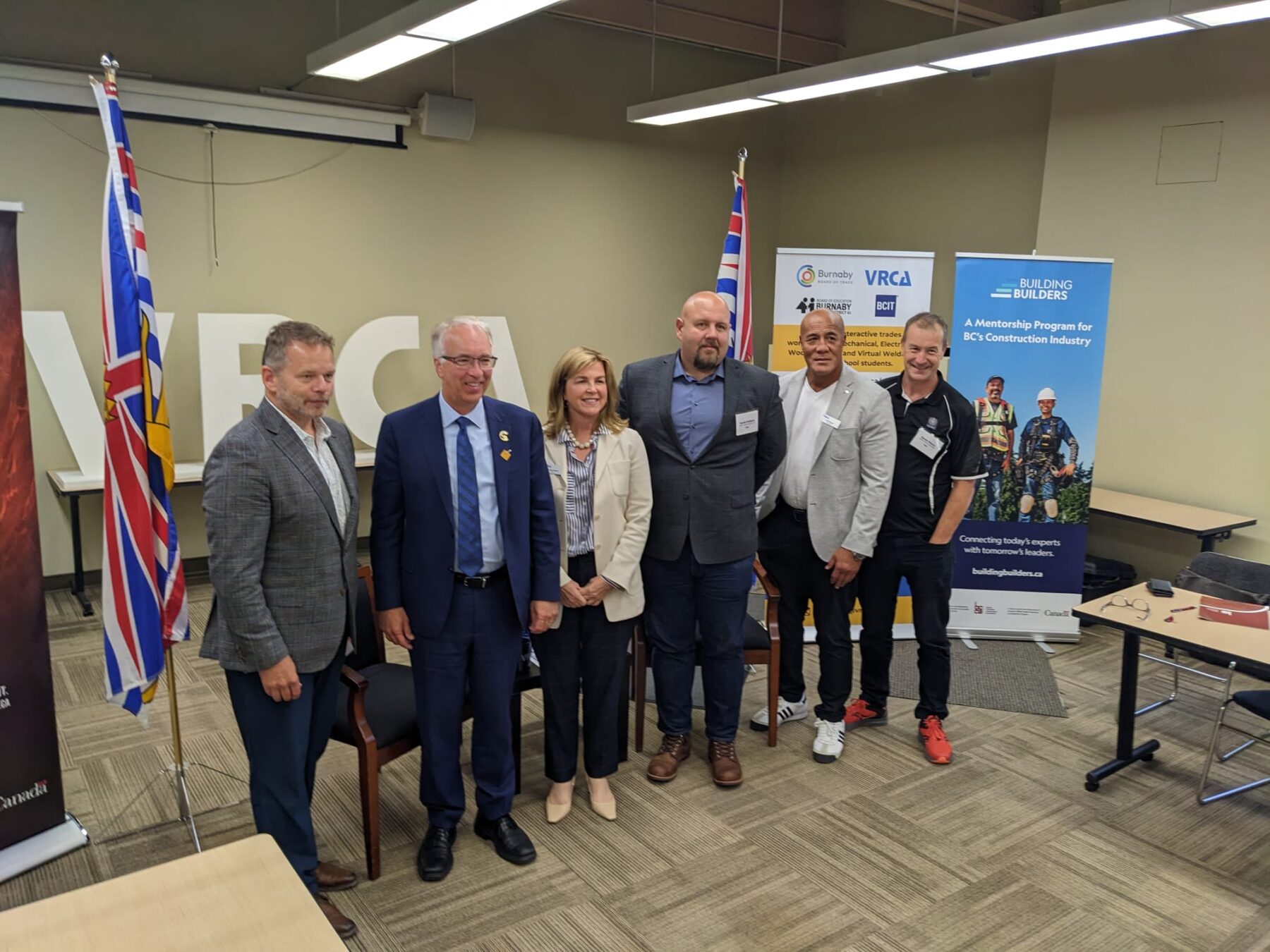Rustad meets with B.C. builders following political shakeup
Conservative Party Leader John Rustad joined B.C.’s construction leaders after BC United suspended its campaign to endorse him.

B.C. Conservative Party Leader John Rustad chats with VRCA President Jeannine Martin. – SiteNews
Key Takeaways:
- B.C. Conservative Party Leader John Rustad discussed his administration’s views on the construction industry shortly after a major political shift where B.C. United Leader Kevin Falcon suspended his campaign to endorse Rustad’s Conservatives.
- The BC Construction Association (BCCA) highlighted prompt payment legislation as the industry’s top priority, urging Rustad to commit to enacting such legislation if elected. Although Rustad expressed interest in ensuring prompt payment, he did not make a firm commitment during the discussion.
- Rustad emphasized the need to address B.C.’s housing and infrastructure challenges by streamlining project permits, upgrading municipal water infrastructure, and focusing on building rental apartments. He also noted the importance of managing the province’s construction capacity and addressing labor shortages through immigration and retaining young talent.
The Whole Story:
Just hours after a massive political shakeup in B.C. was announced, Conservative Party Leader John Rustad joined the Vancouver Regional Construction Association (VRCA) and the BC Construction Association (BCCA) to chat about what his administration would do to support the province’s builders.
Earlier that day, B.C. United Leader Kevin Falcon announced that he would suspend the Official Opposition’s campaign and endorse Rustad’s B.C. Conservatives, completely shaking up the race.
“The political landscape is changing a fair bit so it’s hard to know exactly how this will play out, but obviously removing one of the opponents off the ballot, that is going to be helpful,” said Rustad.
While introducing Rustad, BCCA President Chris Atchison stressed that ensuring the flow of payment remains the number one issue the industry faces and urged Rustad to enact prompt payment legislation if elected in October.
“It’s important to us that all parties seeking election in October understand what matters to our industry. We are after all about 250,000 strong in the province of British Columbia and the number one goods sector employer,” said Atchison. “That’s a lot of voters for a party looking to bridge a narrowing gap.”
He added that B.C.’s construction industry has diligently met with officials time and time again to advocate for the issue, even producing a cross-jurisdictional analysis of prompt payment, but little movement has happened.
“Our industry has been patient, but the time to act is long overdue, and our province faces considerable housing and infrastructure challenges, and it needs a healthy and confident construction industry now, more than ever,” said Atchison. “We need the will of the political party to make prompt payment happen.”
During the conversation, Rustad did not make a firm commitment to advance prompt payment legislation but did note that he is very interested in making sure that there is a process that goes forward that ensures people are getting paid for work.
“We need to de-risk projects and part of that is a commitment that people get paid,” said Rustad. “We got to make sure that we don’t end up, you know, passing the problem down the line in terms of how that works, I want it to flow all the way through.”
Our industry is suffering because of government inaction on issues like the enactment of Prompt Payment Legislation, Lien Reform and Adjudication. We are looking for firm commitments from candidates of all parties. These issues must be dealt with in the next legislative cycle.
Chris Atchison, President, BC Construction Association
He added that another part of de-risking major projects is ensuring there is a full scope so that contractors know exactly what they are bidding on.
“Then the contractor has the opportunity to get it done in a timely way because everyone knows if you get it done fast, you can make money,” he said.
Rustad recognized that to address many of the province’s needs, an immense amount of construction must be undertaken. When it comes to speeding the process up, he plans to consolidate things into a single project permit process. On the municipal side, he intends to use support for water infrastructure upgrades to motivate cities to do pre-zoning as part of their official community plan.
Rustad also noted that he believes government is building too many things at once, stretching its resources thin.
“There are so many projects going on right now. We don’t have the capacity to build all at the same time,” said Rustad. “That means the cookie jar is not only empty but tomorrow’s money is gone too. And so we’ve got to figure out how we structure that in a way that is manageable.”
On housing, Rustad intends to focus on building apartment rentals.
“We will work with the federal government on a program that allows for the rapid appreciation of capital so that projects can get built much faster,” he said. “It worked then. Most of our rental stock was built back in the 60s and 70s.”
He believes the biggest barrier to achieving more housing and building out the province’s infrastructure is labour.
“We are actually seeing housing starts decline in British Columbia at a time when they need to expand.”
He intends to take control of immigration in B.C. and adopt a strategy similar to Quebec.
“That will allow us to work with foreign colleges and universities to make sure that the people coming have the same kind of credentials and skill sets that we expect them to have,” said Rustad.
In addition to immigration, Rustad wants to try to keep young people from leaving the province. He noted that one in two young people in B.C. are considering leaving. This means bringing down the cost of living, increasing safety and improving services.

“Everybody that came to this province, whether it’s our generation with this five generations or seven generations, but whatever it may be, we all came here because we believed that British Columbia was a place we could build a future,” said Rustad. “That’s being lost. And we have all the resources we could want. We have all of the opportunities you could ever want. We have a well-trained, well-educated population, but we are hopelessly mismanaged at all levels.”
VRCA President Jeannine Martin noted that Rustad’s party platform seems to have consistent and significant support for forestry, mining and B.C.’s resource Industries. She stated that construction has a similar economic impact on GDP, $27 billion which is 10% of GDP, and asked if he would consider creating a Minister of Construction position to ensure that the sector is getting the attention it deserves.
Rustad did not make any commitment on the issue, saying that it would be something safer to explore after the election.
“We have a lot of work to do to get there but if we have the honour of framing government. I will be looking at realigning ministries,” he said.
The province’s construction associations thanked Rustad for taking time to meet with construction leaders and expressed how important these conversations are.
“It is essential that all political leaders and candidates understand the issues that affect our members and the broader construction community,” said Martin. “This conversation was an opportunity to ensure that the Conservative Party leader is well-informed about our sector’s priorities and that our members’ voices are heard during this election period.”
“That Mr. Rustad kept his engagement given the events of yesterday is admirable,” said Atchison. “He rightfully described the construction industry as resilient and adaptable, but make no mistake: our industry is suffering because of government inaction on issues like the enactment of Prompt Payment Legislation, Lien Reform and Adjudication. We are looking for firm commitments from candidates of all parties. These issues must be dealt with in the next legislative cycle.”
